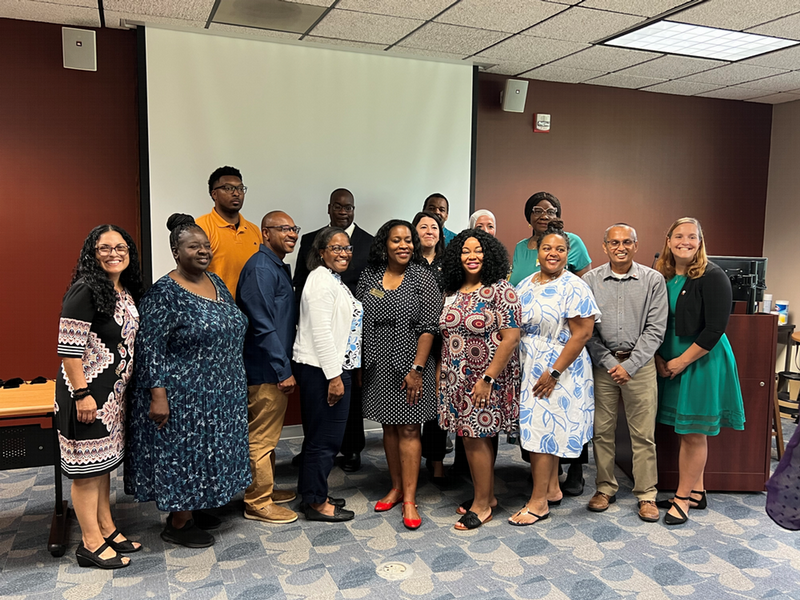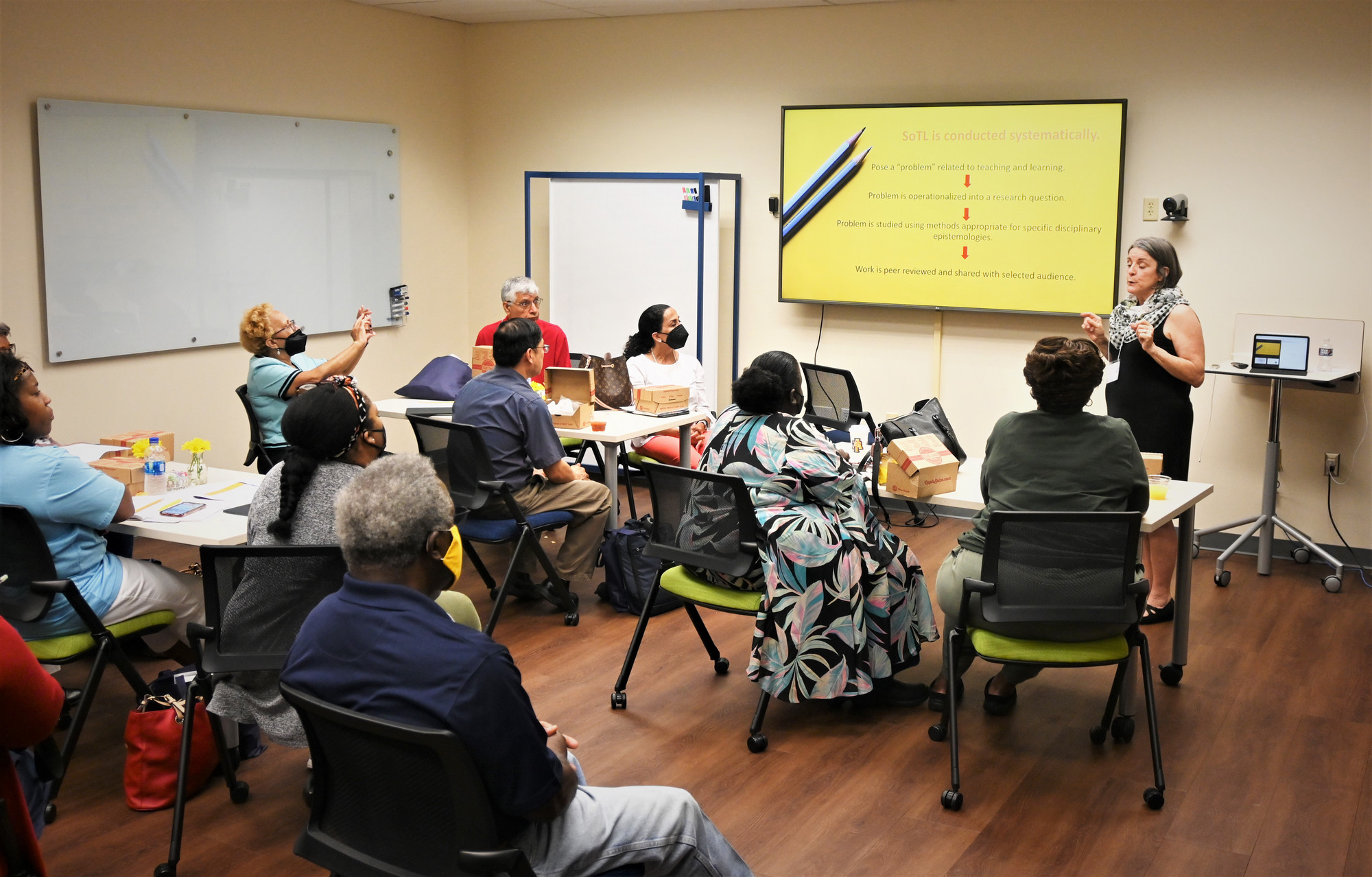Our Programs
Our highly interactive sessions provide evidence-based teaching and learning techniques with practical application to the college classroom. Faculty also enjoy connecting with colleagues across campus. Our goals are for all faculty participants to leave each workshop with at least one impactful practice to employ immediately in their teaching.
The CTE offers a workshop on a plethora of topics for face-to-face and online teaching including setting goals and objectives, aligning activities to course objectives, using alternative assessments, practicing active lecturing, engaging discussions, methods of getting feedback from students, creating classroom community, culturally responsive pedagogies, constructing a teaching philosophy, effective use of groups, fostering critical thinking, wrapping up your course, and using methods for getting students to read more effectively. Workshops vary in length from 30 minutes to 1.5 hours. These are highly interactive sessions providing evidence-based teaching and learning techniques, with practical application to the college classroom. Faculty across campus connect with their colleagues to share ideas and best practices. Short, targeted workshops are also delivered by the CTE staff to faculty during Department or College meetings as requested.Workshops are delivered virtually and f2f.
The Association of College and University Educators (ACUE) is a program that began in 2021 on the NCA&T Campus.
Currently, 130 faculty have earned the ACUE Credential in Effective Teaching Practices or Effective Online Teaching Practices, the only college-teaching credential endorsed by the ACE. An additional 120 have earned Digital Badges in related ACUE Micro-Credential or Quick Study programs including the Fostering a Culture of Belonging. 250 faculty will enroll in the ACUE Teaching and Learning with AI to begin in Fall, 2024.
ACUE’s mission is Student Success through Quality Instruction. The full ACUE program in ETP or EOTP consists of 25 online modules within 5 separate categories: 1) Designing an Effective Course; 2) Establishing a Productive Learning Environment; 3) Using Active Learning Strategies; 4) Promoting Higher Order Thinking, and; 5) Assessing to Inform Instruction and Promote Learning.
NC A&T faculty have increased their self-efficacy significantly as a result of participation and completion of an ACUE course. Faculty report 100% or more self-efficacy in the 25 teaching practices within the 5 separate categories described above after taking the ETP or EOTP courses.
 ACUE Graduates
ACUE Graduates
The CTE received several grants to fund the programs. A grant from the TMCF, Title III and The Bill and Melinda Gates Foundation has supported the ACUE programs. In addition, research on program effectiveness has been conducted and/or is in process.
ACUE Teaching Scholar Program
Faculty who complete one or more ACUE programs are eligible to become ACUE Teaching Scholars. Faculty agree to conduct a SoTL study on the effectiveness of their implementation of ACUE teaching strategies in the classroom. Eligible faculty are invited to present their work at CTE annual events and are given funds to travel to conferences to present their work. To date, the following faculty have achieved this distinction:
Dr. Christopher Horne, Teaching Professor, Dept of Electrical Engineer, College of Engineering
Dr. Meeshay Williams-Wheeler, Associate Professor, Department of Family and Consumer Sciences, College of Agriculture and Environmental Science
Dr. Devona Dixon, Associate Professor, Department of Family and Consumer Sciences, College of Agriculture and Environmental Science
Dr. Natasha Spellman, Assistant Professor, Department of Family and Consumer Sciences, College of Agriculture and Environmental Science
Dr. Roberta Claro Da Silva, Assistant Professor, Family and Consumer Sciences Department. College of Agriculture and Environmental Science
Each semester, the CTE staff selects 2-3 books for small group reading circle discussions. Faculty select the discussion book they are interested in and arrange with other members to decide on meeting times and dates. Reading circles that meet in the Faculty Commons are also provided with snacks and drinks.
The Scholarship of Teaching and Learning (SoTL) is a synthesis of teaching, learning, and research in higher education that aims to bring a scholarly lens—the curiosity, the inquiry, the rigor, the disciplinary variety—to what happens in the classroom. It involves asking and answering meaningful questions about student learning, and about the teaching activities designed to facilitate student learning.
The CTE staff are available for consultations about any stage of the SoTL process (question generation, project design, gathering evidence of student learning, analyzing evidence of student learning, presenting or publishing the work).
For more information on conducting a SoTL study, contact Dr. Audrey M. Dentith (amdentith@ncat.edu). To arrange a SOTL consultation, email Ms. Misha Blount, University Specialist in the CTE. The current focus of our SoTL work is student learning using iPad technology in the classroom. A second focus on current SoTL projects is student engagement and motivation in classes taught by ACUE Credentialed Faculty.

Each year, faculty are invited to apply for this Fellowship. DLFF serve the campus community specifically around the use of effective teaching practices in online settings. Fellows are selected by the Director of the Center for Teaching Excellence and the Assistant Provost of Distance Education and the Extended Campus. DLFF facilitate weekly Online Teaching Check-In, engage in the design and completion of a campus-wide project and offer consultation hours for faculty with questions or needs related to online teaching. DLFF receive a stipend for their appointment.
Math Fellows
Each year, faculty in the math department are invited to apply for a Math Fellowship. The term is a one- year appointment and the application is reviewed by the staff in the Center for Teaching Excellence, the QEP Coordinator and approved by the Math Dept Chair. This position is part of the Quality Enhancement Plan (Toward Enhanced Achievement in Mathematics). Math Fellows design a SoTL (the Scholarship of Teaching and Learning) study with other faculty for the purpose of increasing student learning in mathematics. Math Fellows offer monthly Teaching Supports at Dept meetings. Fellows receive a course release and a stipend for travel and other expenses.
TeachSpark Lightning Talks are 20-minute Teacher Talks for Dept or College Meetings. These are quick ways to facilitate a conversation about teaching during regularly scheduled meetings. Using engaging, inclusive methods to draw faculty into a learning conversation, this opportunity to learn more about teaching ensures that faculty stay focused on their teaching despite the pressures that might pull them in other directions. Faculty appreciate the opportunity to engage with their peers in this way – to connect with colleagues in a casual but informative way.
Topics can include a wide array of subjects. If we don’t already have a talk on a topic of interest in your department, we will research it and prepare for the meeting. Here’s a brief list of what we now offer:
- Using AI -ChatGPT for Creating Assignments
- Using AI- ChatGPT to Support Teaching
- Considerations on ChatGPT and Cheating
- Engendering a Pedagogy of Kindness
- Using Inclusive Teaching Strategies
- Teaching Notetaking in your Class
- Building Relationships with Students
- Teaching the Adult (Post-Traditional) Student
- Using Groups Effectively in Online or F2F Classrooms
- Facilitating Effective Discussions in Online or F2F Classrooms
The Teach Forward Innovation Grant Program provides money to an individual or a small team of faculty to create a new course, augment an existing one and/or, generally, to improve teaching and learning in an Undergraduate or Graduate Class. These grants can be used for a variety of functions including working with community partners, purchasing equipment or software, creating simulations, hosting guest speakers, and more! Funds must be used to directly aid in the creation or improvement of a new course, the improvement of teaching methods in existing courses, or the use of scholarly inquiry into a new teaching practice.
We offer two types of grants to help faculty take their classes to the next level: ScholarlyTeach Grants and Curriculum Development Grants.
ScholarlyTeach Grants
The Association of American Colleges & Universities (AAC&U) has identified specific teaching and learning practices that have been shown to be beneficial to students’ learning outcomes. These practices benefit all students. ScholarlyTeach Grants explicitly use methods of scholarly inquiry in the assessment of the effectiveness of a novel or new teaching practice. These SoTL (the Scholarship of Teaching and Learning) projects include a research component that can lead to scholarly presentations or publications. The ScholarlyTeach Grant will be awarded to projects that involve the improvement and development of the following:
- Integration of Teaching Methods from the ACUE program
- The Use of the iPad in the Classroom
- Undergraduate Research in the Classroom
- Innovation in Inclusive and Equitable Teaching Methods
- Mindfulness and Wellness Methods in Teaching
- Teaching Methods for Sustainability and Eco-Justice
- The use of AI in Teaching and Learning
- Career Preparation and Soft Skills
Curriculum Development Grants
These grants are specifically for curricular changes aligned with department or college goals and awarded to projects that involve the development of
- Service Learning and Community Engagement Courses
- Global Learning and International Studies
- Sustainability and Ecojustice Philosophies and Practices
- Post-Traditional Adult Learners Initiatives
- Interdisciplinary Studies
- Career and Soft Skills Development
Eligibility: All current full-time and part-time NC A&T faculty are eligible to apply for a Teach Forward Grant.
Proposal Criteria and the link to apply can be found @ https://ncatctenewsletter.com/
The CTE and Instructional Technology Training and Development (ITTD) have combined efforts to offer a series of sessions focusing on seven essential topics to help faculty make their online or hybrid (flipped or blended) teaching experience successful. The workshops provide valuable information and best practices for preparing courses and instructing students remotely. Faculty select from a menu of workshops leading to 17 hours of training. Each workshop is 1.5 - 2 hours in length and offers opportunities for engaged and active learning among faculty. Follow the link here for the full curriculum Aggies Teach Curriculum 2021. Visit learn.ncat.edu. The aggiesteach.ncat.edu also offers a plethora of information on teaching practices, classroom models and other key information related to the current needs for teaching in these unusual circumstances.


